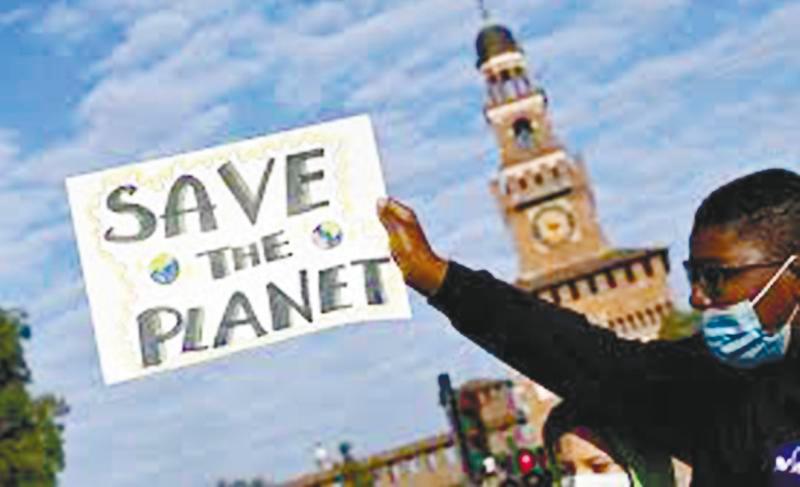ONE billion – this is the approximate number of people projected to be forced to leave their homes as the Earth’s temperature increases, with 9.9 million to shift within Southeast Asia.
Almost a year ago in November 2021, 197 signatories sent delegates to the 26th United Nations (UN) Climate Summit in Glasgow. This event, and the 25 preceding it, has become a symbol for the Sisyphus-like task of unifying world leaders to tackle a global challenge that needs global solutions. They told the story of the geopolitical shifts that have shaped the first decades of the 21st century. But now a new story is hovering above the horizon – and it is equally global, but not all unifying.
More than wars or treaties, the issue that redraws the geopolitical world map is climate, and it is not just because of flooding or droughts, but rather because it redefines the political rules of global action.
The new COP27 (27th UN Climate Summit) is coming soon in November, and one of the main issues to be addressed is that many businesses have started on their climate action journey, but their current targets are insufficient.
What they do in the next five years will be crucial, both for the planet and for their competitiveness. It is time for companies to take decarbonisation to the next level.
According to a partner at Roland Berger Southeast Asia, Dieter Billen: “Asian countries and companies are increasingly committing to environmental sustainability. This is because the action will need to be in Asia – with 51% of global CO2 emissions, 60% of the world’s population, more than two-thirds of global steel and cement production, and more than 70% of the world’s coal power production. The region will need an energy and decarbonisation revolution to limit global warming. The current situation of extremely high prices for gas and coal will accelerate Asia’s energy revolution.”
A carbon-reduced, climate-changed world will present new geopolitics, with less dependency on fossil fuels. Coltan, lithium and rare earth remain scarce, and are needed for batteries and tech products. And then, there are two additional resources – sun and water.
Water is less abundant than sunlight, and as such, it has been a resource of conflict throughout human history. Head of the Oakland-based Pacific Institute, Peter Gleick, has counted 926 major water conflicts – or even wars – in the last 4,000 years. And with fresh water consumption now growing faster than the population, it remains a cause of conflict.
With climate change, tensions will rise sharply. Global warming will lead to some significant changes in precipitation across some regions.
It is still almost impossible to predict which areas get more and which get less rainfall, which will see flooding, and which will see drought. But these redistributions of water will lead, if not to wars, then to another form of unrest: Migration.
Singapore-based geostrategist Parag Khanna says: “Too much water is better than too little water. With too much water, you may have to move some hundred metres away from the river – with too little water, you will have to find another place to live.”
Climate migration a hot issue
“Agriculture is moving north, and people will follow,” predicts Khanna. “Former fertile and densely-populated regions get reduced to solar energy production.” From South China to Siberia, North India to Kazakhstan, the US “sun belt” to the Great Lakes, Brazil to Patagonia, the Mediterranean to Scandinavia.
Khanna means large-scale when he says by the end of the century, we may see “two billion people moving north”. This will not only redraw the world map, it will also redraw human civilisation – and require a huge amount of at least regionally coordinated action.
Threats are immediate
According to former executive secretary of the UN Framework Convention on Climate Change, Christiana Figueres, the climate change threats are immediate.
Decarbonisation in Asia can be more challenging than in other parts of the world, but also provides more opportunities. Asia is at the centre of global supply chains, and is crucial for the world’s fight against climate change. Asian companies and conglomerates have a track record of tapping into new business opportunities and are significantly investing in low- or zero-carbon business opportunities, such as renewables along the value chain, electric vehicles and batteries – and increasingly at the forefront of innovation.
There is a window of opportunity to forge some kind of global climate solidarity and action. But it will not be open for long. With the results of climate change becoming more visible and predictable, global solidarity may dwindle once more and the window for global action against climate change could close.
The article was contributed by Roland Berger Southeast Asia, a management consultancy that offers a combination of analytical approach and expertise to meet the challenges of today and tomorrow. Comments: letters@thesundaily.com













